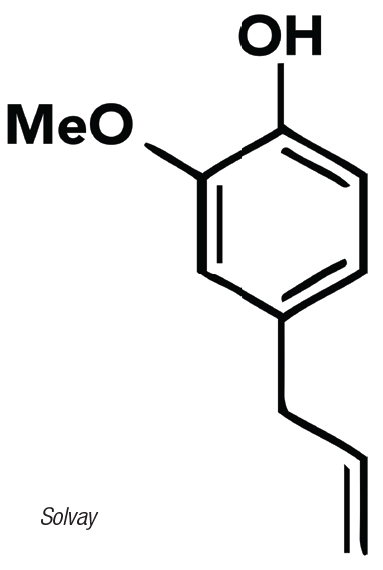 Solvay S.A. (Brussels, Belgium; www.solvay.com) recently announced a new commercial process for synthetic eugenol (diagram), a derivative of phenol, whose natural version is extracted from clove oil obtained from dried flower buds of clove trees grown in Indonesia and Madagascar. Synthetic eugenol offers a cost-effective alternative supply of the compound for applications that do not specifically require natural origins, and also offers protection from price volatility of natural clove oil for fragrance formulators.
Solvay S.A. (Brussels, Belgium; www.solvay.com) recently announced a new commercial process for synthetic eugenol (diagram), a derivative of phenol, whose natural version is extracted from clove oil obtained from dried flower buds of clove trees grown in Indonesia and Madagascar. Synthetic eugenol offers a cost-effective alternative supply of the compound for applications that do not specifically require natural origins, and also offers protection from price volatility of natural clove oil for fragrance formulators.
As Corinne Duffy, the eugenol project manager at Solvay Aroma Performance, explains, the synthetic route for eugenol was first imagined by scientists at Solvay affiliate Rhône-Poulenc in the early 2000s, but the process never progressed beyond the pilot stage because the purification is very challenging, rendering the process economically unattractive. In the past two years, Solvay scientists, driven by strong demand for eugenol, revisited the process, focused on increasing yields and improving the separation stage.
The resulting process begins with phenol, which is converted into catechol, and then, from that, into the intermediate guaiacol. “Guaiacol is a key product in our chain, as it can be used for many applications,” Duffy says. These applications include using guaiacol as an intermediate in the production of the flavor molecule vanillin and the cough suppressant guaifenesin, as well as the main raw material for the production of eugenol. The synthetic eugenol process features a carefully designed distillation stage to separate the desired end-product (para-eugenol) from the various co-products and byproducts with similar boiling points that result from the reaction of guaiacol to eugenol, Duffy explains.
Synthetic eugenol is now available to the fragrance market, Duffy says, but in the near future, the product could be incorporated into oral care products (toothpaste and mouthwash) for its antiseptic properties, once the company secures the necessary certifications.